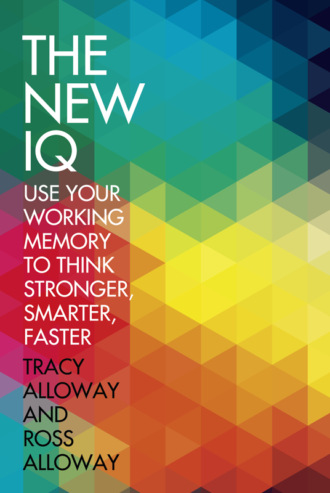
Полная версия
The New IQ: Use Your Working Memory to Think Stronger, Smarter, Faster
Adapt to New Situations
Have you ever wondered why some people who get laid off, divorced, or move across the country for a job transfer manage to land on their feet and thrive while others struggle to find their way? A strong working memory is the key to being able to switch gears and reinvent your career, jump back into the dating pool after years of marriage, or create a new life in a new home. Why? Because the working memory Conductor allows you to shift smoothly from thought to thought, to look at the world in a different way, and to think about old information in novel ways.
Stay Motivated to Achieve Long-Term Goals
Let’s say you’re finishing up your secondary education, and you aspire to an Oxbridge college. You may have high marks, but you still have to perform in your A-levels. If you study diligently, you can get the grades you need and stand a good chance of gaining entry to an elite institution. Working memory helps you keep your goal in mind and gives you the motivation you need to put your nose to the grindstone even when your friends are heading out to a party and invite you to join them. Working memory helps you say no.
Stay Positive in the Midst of a Dire Situation
Your Conductor is wired to organize emotions into those that are relevant and those that are not. The Conductor interprets signals from the amygdala, the primitive emotional heart of the brain that generates feelings of fear and anxiety, and then modulates those emotions to help us concentrate on positive thoughts. Later, we’ll show you how this played out when Mario Sepulveda, one of the thirty men rescued from a collapsed Chilean coal mine in 2010, used humor to keep the group from devolving into chaos. Even during the gloomiest days underground, Mario was able to stay upbeat by focusing on the future.
Follow Your Moral Compass
Working memory helps you do the right thing in business, in social interactions, and even in your romantic relationships. It can help you stay faithful while others stray. Research shows that a good working memory gives you romantic self-control. People with a robust working memory manage to keep their relationship goals in mind and act to protect their relationship when something threatens it—like when an attractive coworker comes on to you during a business trip. Conversely, people with poor working memory are more vulnerable to giving in if an opportunity to stray presents itself.
Be a Better Athlete
There are times when a powerful working memory can be your best teammate. Let’s say you’re a tennis player. When the tennis ball comes bouncing to your side of the net, what shot do you make? Forehand cross-court, backhand down the line, lob, drop shot? Working memory helps you sift through the options and choose the best one, all while keeping in mind your opponent’s position on the court. The more quickly your working memory can process all this information, the more likely you are to execute the shot well.
The Most Important Learning Tool: The New IQ
Our society has relied on IQ as the go-to measure of intellectual capability for nearly a century. The common belief is that the higher your IQ, the better your advantage in whatever you do. But a high IQ doesn’t necessarily mean you will get what you want in life. On the other hand, how do some people with below-average IQ scores rise to the top to become business bigwigs, bestselling authors, or innovative inventors? What if we told you that IQ isn’t the best measure of intelligence or the best predictor of lifetime success, especially not in the twenty-first century?
The modern IQ test has its roots in the early twentieth century. In 1917, as World War I raged on, the U.S. Army enlisted Richard Yerkes, the distinguished president of the American Psychological Association, to create a test to measure the intelligence of nearly 3 million army recruits. The army wanted to determine which men should be officers and which should be relegated to the lower ranks. Yerkes designed a test that measured the recruits’ knowledge of facts and vocabulary, also known as crystallized knowledge.
But during wartime when nothing goes according to plan and you have to adapt to enemy tactics or lose, knowing concrete facts—say, that Rutherford B. Hayes was elected president in 1876 or that Bismarck is the capital of North Dakota—isn’t really helpful. Many of the men tagged for high-ranking positions failed miserably, while some men who languished in the lower ranks proved to have excellent military minds. The army quickly realized that Yerkes’s test was identifying the wrong men for the job and abandoned it after six months. But the rest of society has continued to measure intelligence based on the amount of crystallized knowledge you have, and the modern IQ test doesn’t look all that different from Yerkes’s test. That’s a big problem.
Thanks to Google and similar search engines, the world has undergone profound transformation in how we seek out, weed out, and absorb information. We live in the Google age. In cognitive terms, Google is great. It has considerably reduced the amount of intellectual resources that we previously had to dedicate to rooting out facts before we could do something with them. Because of Google, we no longer need to rely so much on crystallized knowledge—the memorization of facts, dates, or names—associated with IQ and the traditional concept of intelligence. With nothing more than a few clicks, we can pull up just about any information we need. But the key to intelligence today is being able to put those facts together, prioritize the information, and do something constructive with it. And there is one skill that gives you the advantage of managing all this information: working memory. IQ is what you know. Working memory is what you can do with what you know.
In one of her earliest research projects, Tracy compared students’ grades with their IQ and working memory scores. She found that working memory could predict what grade they would get with far greater accuracy than IQ. In fact, if Tracy knew a child’s working memory, she could determine his or her grades with 95 percent accuracy. In Chapter 5 we will go into much greater detail about this study and other research showing that working memory gives you more of an advantage in the classroom than IQ. Here are just a few of the many fascinating and sometimes surprising findings we will explore in that chapter:
A good working memory is the best advantage in school and is causally related to grades.
Kids with good IQ scores don’t necessarily have a good working memory.
An average or even a high IQ doesn’t necessarily give the student the tools for success in the classroom and beyond.
IQ is linked to how rich or poor you are, but working memory isn’t, which makes it a great equalizer.
The research on working memory also shows that the strength of a person’s working memory influences far more than grades. An abundance of new evidence, which we present in this book, shows that the strength of your working memory plays a pivotal role in how successful you will be in many areas of your life, including whether you’ll have the fortitude to work toward your long-term goals, whether you view the glass as half-full or half-empty, and even whether you’ll be able to lay off the junk food when dieting.
How Working Memory Is Undermined
Unfortunately, many things in our fast-paced 24/7 society are working against us to weaken our working memory. And when working memory isn’t operating at full speed, it puts us at a big disadvantage.
Information Overload
If your working memory isn’t up to snuff, you could drown in the overwhelming flood of data. Todd learned about the impact of information overload the hard way. As a serial entrepreneur, the thirty-five-year-old father of three was no stranger to the frenetic pace of a Silicon Valley high-tech start-up company. He spent every day sitting in front of four computer screens that beeped and pinged and flashed email alerts, instant messages, websites, and Twitter feeds. His clients constantly called his home office, his kids demanded attention, and he was inseparable from his iPhone as he toggled between his home and office life. For more than a year, Todd had been looking for a buyer for his company. But when a large company based on the East Coast emailed Todd saying that they were interested in acquiring his firm, the email got lost in the chaos of his life and he didn’t discover it in his email inbox for over a week. If he hadn’t finally stumbled across it when scanning back through his correspondence one evening at home, he might have lost what turned into a $2-million-dollar sale.
The Lure of Instant Gratification
In our I want it now society, we want immediate satisfaction. Our quest for the fleeting thrill we get from an impulsive purchase or from eating an entire bag of chips when we’re on a diet, relegates working memory to the sidelines of the decision-making process. This is why we so often opt for smaller, more immediate rewards rather than waiting for bigger and better things, like a fat bank account, or a slim waistline.
Time Constraints
Being squeezed for time burdens working memory and makes you more likely to give in to impulse—whether you’re confronted with a limited-time-offer purchase, for example, or trying to select the correct answers while taking a timed test, or even when faced with an ultimatum from a significant other to get engaged now or break up. In Chapter 2, we look at how this plays out on eBay, where the ticking clock can overwhelm your working memory, making it more likely you will give into impulse and pay more than you should.
Stress
When the pressure is on, it can overload your working memory and sabotage your performance at work, at school, or even on the pitch. Think of the angst that every team feels in a penalty shoot-out against Germany. Their reputation for flawless penalties transforms some of the world’s best players into tripping toddlers. Stuart Pearce, Chris Waddle, Gareth Southgate—all these England players stepped up to take penalties in shoot-outs against Germany—and stress caused them to miss. Goodbye, glory.
Retirement
Sorry to burst your bubble, but if you’ve been dreaming about the day you can say good-bye to the 9-to-5 grind and hello to retirement, we have to inform you that retirement makes you dumb. Retirement marks not just a reduction of work, but also a reduction in thinking and, consequently, a reduction in your working memory strength.
Pain
If you’ve ever slammed your hand in the car door or spilled boiling water on your lap, you know that it’s tough to think clearly when you’re in pain. Scientists have discovered that pain, including chronic aches like a sore back or knee, may disrupt working memory.
Romance
What does romance have to do with working memory? In a 2012 study, Jeffrey Cooper and colleagues at Trinity College Dublin discovered that the PFC plays a big role in the first flush of attraction. They scanned the brains of nineteen- to thirty-one-year-olds on the prowl and showed them photos of potential mates. Some photos caused a burst of activity in parts of their PFC. Participants then went to a speed-dating event, and the researchers discovered that the stronger the activation in the PFC, the more likely the participants were to pursue a second date. If you find your working memory working overtime when you first meet someone, there is a good chance that you’ll take a chance and ask them out.
Some exciting new research by Johan Karremans at Rodboud University in the Netherlands offers insight into why men often become tongue-tied when meeting a woman whom they find attractive. He found that men’s scores on a working memory test were lower after they’d had a brief conversation with a beautiful woman. And intriguingly, he did not find this “attraction effect” in women after they’d had a conversation with a handsome man. His interpretation of his results is that because traditional gender roles require men to take the initiative in engaging in conversation with a potential mate, their working memories are more taxed by the process.
Video Games, Smoking, and Overeating
Whatever your guilty pleasure may be, it can take your working memory offline. A healthy working memory inhibits self-destructive habits, but engaging too often in highly addictive behaviors causes changes in the brain. Basically certain brain regions gang up and recruit your working memory into fulfilling the addictive desire, rather than stopping it.
How Working Memory Can Be Improved
As little as five years ago, people thought that working memory was fixed—that you were stuck with what you were born with. But research is showing otherwise. Think of working memory as like a rubber band. Some rubber bands are big, and some are small, but they can all be stretched. In the same way, we’re all born with a certain level of working memory. But regardless of our genetic predisposition for a strong or not-so-strong working memory, nearly every one of us can stretch it to get a bigger advantage in life.
The lessons we’ve learned from our work with students to train their working memory with the Jungle Memory software Ross developed have confirmed that significant improvements are possible. Take the case of a young girl named Jasmine. She was often told that she needed to “try harder,” but despite doing her best, she couldn’t keep up at school or follow her mom’s instructions at home. After being diagnosed with a working memory deficit, Jasmine used the Jungle Memory program for eight weeks and saw dramatic results. She improved her working memory by over 800 percent (an amazing result!) and started winning achievement awards at school.
Tracy has also seen significant improvements in clinical trials when she tested the working memory of students with reading and math difficulties. After they had trained regularly for eight weeks with Jungle Memory, they showed fantastic improvements in working memory; even more exciting was that their grades also improved—generally a whole grade point, such as from a C to B or a B to an A. Another study showed that they maintained all of these improvements eight months later.
Throughout this book, we introduce you to a host of simple working-memory-training exercises, so that you can get started on getting your working memory in shape as you read. And at the end of the book, we provide a quick hits training manual that you can use on the go to help keep your working memory sharp.
In the chapters that follow, we first draw on more than a decade of research and practical experience to explore why working memory is so vital in our lives and the role it plays in our general work aptitude and in our general life happiness, as well as in learning, overcoming addiction, and achieving in sports. In part II, we show you how working memory changes during our lives from childhood to old age and introduce encouraging evidence about how we can keep our working memory in good shape during later life. We also present specific tools for strengthening working memory—from the most effective brain training programs, to the best foods to eat (some of them may surprise you), to small but crucial tweaks in your daily habits that can make a big difference for your working memory. The chapters in part III imagine a future in which the world is designed to give our working memory the best advantage and look at groundbreaking research on how it gave our ancestors an evolutionary advantage.
Test Your Working Memory
To help you get a basic understanding of the strength of your working memory, here are two quick tests. For a more detailed measure of your working memory power, take the full online test at http://testwm.com.
Test 1
Below is a list of three-letter words. Don’t look at it! Ask a friend to quiz you using the list of words. In level 1 of this test, your friend is going to read aloud two words, like cat and bat. You have to try to remember the two words, reverse them, and repeat them backward. Tab. Tac. In level 2, you have to do the same with three words. In level 3, it’s four words. Most people are able to do level 1, but you need a strong working memory to complete levels 2 and 3 correctly.
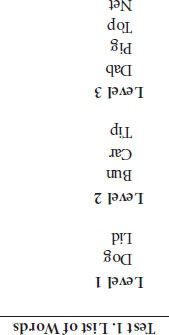
Test 2
Level 1
1. Look at the pyramid below. Remember the triangle where the letter appears.
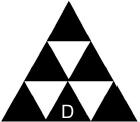
2. Now look at this picture. Does it start with the same letter as the letter in the triangle?
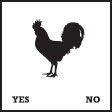
3. Here is another pyramid. Remember the triangle where the letter appears.

4. Now look at this picture. Does it start with the same letter as the letter in the triangle?
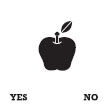
5. Now draw arrows to the triangles where the letters appeared, in the correct order.

Level 2
Follow the same directions as in Level 1.
1. Remember the triangle where the letter appears.

2. Does the picture start with the same letter as the letter in the triangle?
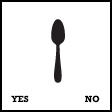
3. Remember the triangle where the letter appears.
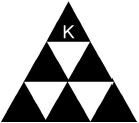
4. Does the picture start with the same letter as the letter in the triangle?
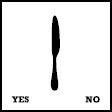
5. Remember the triangle where the letter appears.

6. Does the picture start with the same letter as the letter in the triangle?

7. Now draw arrows to the triangles where the letters appeared, in the correct order.

Level 3
Follow the same directions as in Level 1.
1. Remember the triangle where the letter appears.
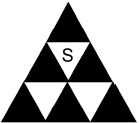
2. Does the picture start with the same letter as the letter in the triangle?

3. Remember the triangle where the letter appears.

4. Does the picture start with the same letter as the letter in the triangle?

5. Remember the triangle where the letter appears.
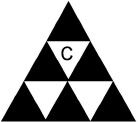
6. Does the picture start with the same letter as the letter in the triangle?
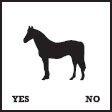
7. Remember the triangle where the letter appears.
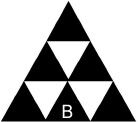
8. Does the picture start with the same letter as the letter in the triangle?

9. Now draw arrows to the triangles where the letters appeared, in the correct order.

Scoring
The number of letters you can remember in the correct order gives you an indication of the strength of your working memory. If you are like most adults, you were probably able to complete levels 1 and 2 of this test correctly. Data from thousands of people confirm that the average five-year-old can remember and process two things. Most adults are able to remember four or five items in the correct order.
If you didn’t fare so well on these tests, don’t get frustrated. You can always make an improvement. If you aced these assessments, don’t get too smug. You need to continually challenge your working memory to keep it in tiptop shape. Doing brain training exercises, such as the ones in this book, can help optimize your working memory.
Конец ознакомительного фрагмента.
Текст предоставлен ООО «ЛитРес».
Прочитайте эту книгу целиком, купив полную легальную версию на ЛитРес.
Безопасно оплатить книгу можно банковской картой Visa, MasterCard, Maestro, со счета мобильного телефона, с платежного терминала, в салоне МТС или Связной, через PayPal, WebMoney, Яндекс.Деньги, QIWI Кошелек, бонусными картами или другим удобным Вам способом.

